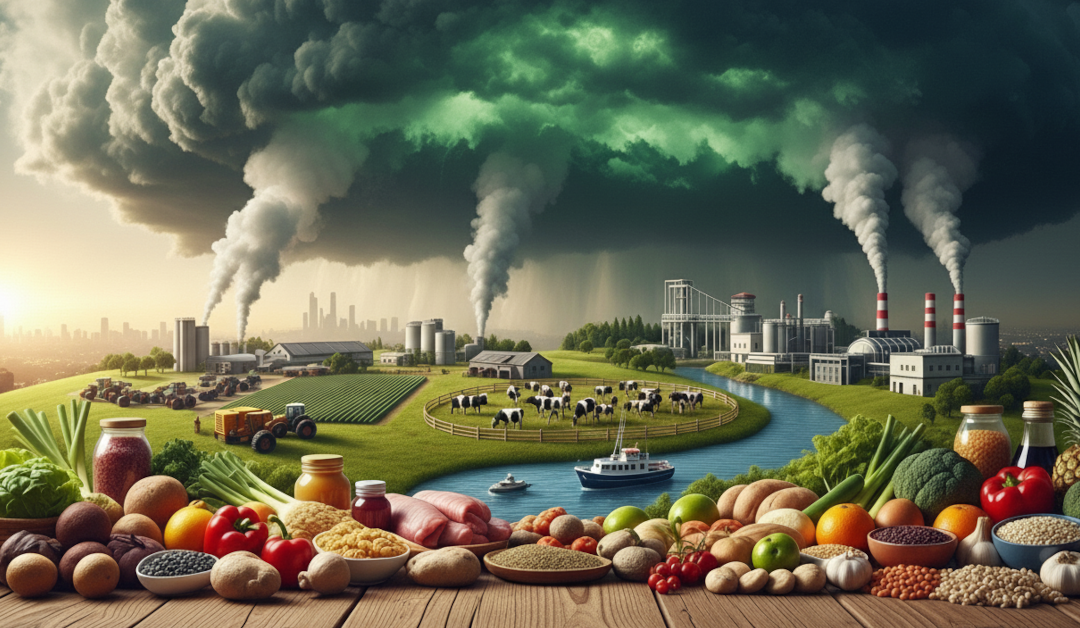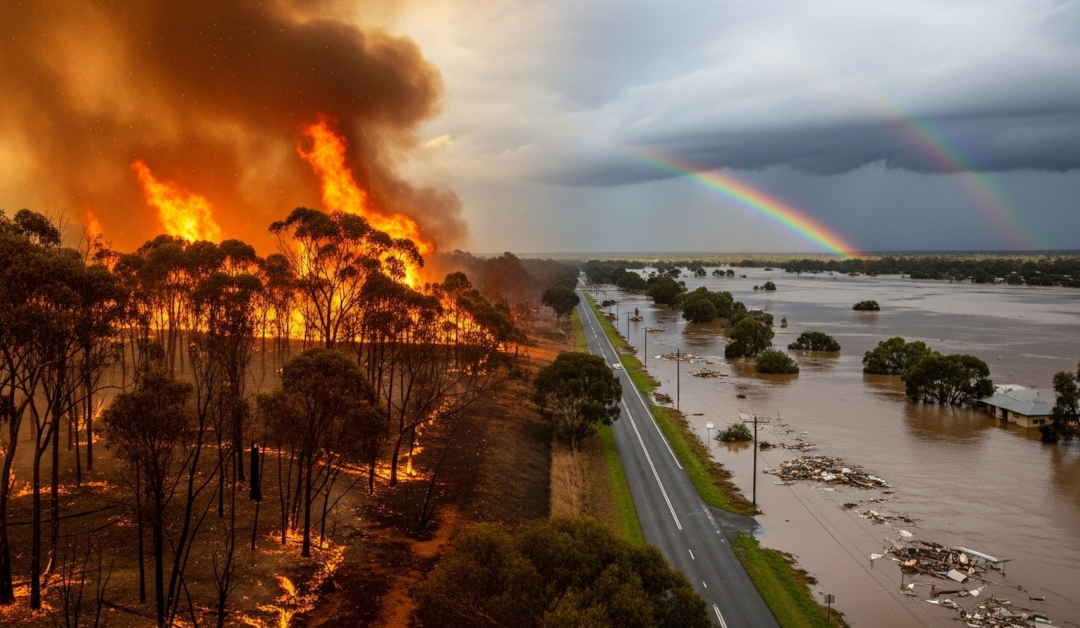Messages from Our Director
A space for reflections, insights, and thoughts on climate change and the world we share.
From the heart of Nurtureland, these messages invite you to pause, reflect, and journey with us toward a brighter, harmonious future.

Director’s Message: Food, Climate, and Action at COP30
Nov 19, 2025 | Director's Message
As world leaders gather for COP30 in Belém, Brazil, against the backdrop of the Amazon rainforest, the urgency of addressing the global food system is clearer than ever. As a recent article by the UN Foundation (UN Foundation: A new way forward for food systems on the COP30 agenda) notes, agriculture is the number one threat to the Amazon and the food system contributes to a third of all global greenhouse gas emissions.
Brazil’s presidency has rightly made food systems one of six conference priorities. However, while the transformation of food systems offers a “triple win” for people, planet, and prosperity , we must confront the missing piece in the global conversation: a commitment to moving away from unsustainable animal-sourced proteins.
The Need for a Plant-Rich Future
The data is compelling: livestock farming is the single largest source of methane from human activity. Furthermore, while occupying 77% of the world’s agricultural land, livestock only produces 18% of global calories. Experts agree that livestock levels must be reduced by 61% by 2036 to achieve the goals of the Paris Agreement.
The UN Foundation article highlights that we currently lack an agreed-upon, integrated global policy pathway for food systems, unlike the energy sector. Instead, we rely on a “patchwork of voluntary targets”, which often omits the need for protein diversification, a shift towards plant-based foods. This transition is crucial for both planetary and human health, as a plant-rich “planetary health diet” could prevent thousands of early deaths daily and halve food-related emissions by 2050.
The slow pace of government action is understandable when we consider that transformation requires unified policies that straddle various areas, from agriculture to health to national security. Furthermore, industrial agriculture still holds its grasp on nations, particularly concerning exports. Yet, countries like Denmark are providing a blueprint, positioning themselves as leaders in plant-based food production through unified policy and industry incentivisation. This demonstrates that where there is political will, a sustainable and equitable shift is possible.
Our Path Forward
At Nurtureland, our vision to shift towards a humanitarian way of life and embracing vegetarianism aligns perfectly with the urgent need to address the systemic drivers of climate change.
We cannot wait for global agreements to force the changes that our hearts and consciences already tell us are necessary. The change begins with each of us, within our homes and our communities. It is absolutely important to promote awareness of the benefits of plant-based foods within the community. Our monthly vegetarian cooking classes, for instance, are an excellent first step towards heading in the right direction. They are a practical, joyful way to inspire and support people on their vegetarianism journey, helping friends, families, and communities discover a balanced lifestyle that is healthier for themselves and for the planet we all share.
Let us continue to nurture this awareness and inspire action, ensuring our local efforts contribute powerfully to the global shift we so desperately need.

Director’s Message: Victoria’s Changing Climate
Aug 21, 2025 | Director's Message
At Nurtureland, we are deeply committed to understanding and responding to the changes in our environment. Findings from the Victoria’s Climate Science Report 2024 make it clear that Victoria’s climate is already changing.
https://www.climatechange.vic.gov.au/victorias-changing-climate
The evidence is undeniable. Global temperatures are rising, sea levels continue to climb, and extreme weather events are becoming more frequent and severe. Here in Victoria, we are seeing these impacts firsthand. Since the 19th century, our state has warmed significantly, rainfall patterns have shifted, and climate hazards such as bushfires, floods, and heatwaves are becoming more intense.
The report highlights some of these observed changes to 2024:
- Average annual temperature has increased by 1.2°C since 1910.
- Heatwaves are becoming longer, more intense, and more frequent.
- Very hot days have more than doubled since 1986–2005.
- Bushfire frequency and severity have increased.
- Rainfall patterns are changing, with cool season rainfall declining by over 10%.
- Snow depth and cover in alpine regions have decreased since the late 1950s.
These changes remind us that climate change is already here, reshaping the way we live, work, and care for our environment. Through choices such as embracing vegetarianism and reducing waste, we can support sustainable growth, and help protect the future of our communities and natural landscapes.
Together, we can make a difference in how Victoria adapts to a changing climate.
Director’s Message: Listening to the Earth’s Warnings
May 21, 2025 | Director's Message
As we move into the cooler months, many of us have likely noticed the warmth still lingering in the air. Even now, in May, Australia is experiencing unusually high temperatures and dry conditions across much of the southern half of the country. A recent article titled “It’s almost winter. Why is Australia still so hot?” shed light on this phenomenon—explaining how persistent atmospheric patterns and the clear signals of human-caused climate change are influencing our seasons more than ever.
We find this a sobering but important reminder. The article points to record-breaking warmth in parts of Victoria and Tasmania, and even heat-stressed oceans around our coastlines. These changes are not distant or abstract—they are happening here and now, and they affect the ecosystems we rely on, the food we grow, and the rhythms of daily life.
At Nurtureland, our mission has always been to live more harmoniously with nature—to learn from it, care for it, and in turn, let it care for us. This unusual weather reinforces why our collective choices matter. Embracing a plant-based lifestyle, reducing our footprint, and educating our children with environmental awareness are no longer just good ideas—they are necessary.
We encourage you to read the article, reflect with your families, and think about what small steps we can take together. The earth is speaking; may we continue to listen, respond with care, and walk gently on this shared path.
Director’s Message
Feb 21, 2025 | Director's Message
January-September 2024 was 1.54±0.13°C above the pre-industrial average.
Following a prolonged La Niña, which is typically associated with a temporary reduction in global temperatures, from late 2020 to the early months of 2023, a strong El Nino event boosted global temperature to record observed levels later in 2023 and through 2024. For 16 consecutive months (June 2023 to September 2024), the global mean exceeded anything recorded before 2023 and often by a wide margin. 2023 and 2024 will be the two warmest years on record, with the latter being on track to be the warmest, making the past 10 years, 2015 to 2024, the warmest ten years in the 175-year observational record.

Vegetarianism plays a significant role in addressing global warming by reducing greenhouse gas emissions. The livestock industry is a major contributor to climate change, responsible for a large share of methane and nitrous oxide emissions, which are more potent than carbon dioxide. By shifting to a plant-based diet, individuals can lower the demand for meat and dairy, thereby decreasing the environmental impact associated with animal farming. Additionally, plant-based agriculture generally requires less land, water, and energy, further mitigating deforestation, habitat loss, and resource depletion. Adopting vegetarianism can thus contribute to a more sustainable and climate-resilient food system, helping to combat global warming.
Director’s Message
Nov 21, 2024 | Director's Message
Some changes (such as droughts, wildfires, and extreme rainfall) are happening faster than scientists previously assessed. In fact, according to the Intergovernmental Panel on Climate Change (IPCC) — the United Nations body established to assess the science related to climate change — modern humans have never before seen the observed changes in our global climate, and some of these changes are irreversible over the next hundreds to thousands of years.
Scientists have high confidence that global temperatures will continue to rise for many decades, mainly due to greenhouse gases produced by human activities.
The scientific evidence is unequivocal: climate change is a threat to human wellbeing and the health of the planet. Any further delay in concerted global action will miss the brief, rapidly closing window to secure a liveable future.
